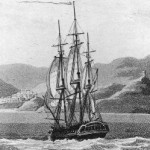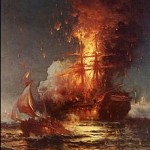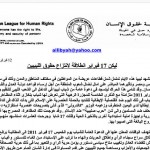America’s Military Connection to Libya and Tripoli’s Link to the US Marines’ Hymn
Two Hundred years ago the newly independent U.S.A. won a military victory in Libya that inspired the famous words from Francis Scott Key:
THE MARINES’ HYMN
From the Halls of Montezuma
To the shores of Tripoli
We fight our country’s battles
In the air, on land and sea.
…
United States relations with what is now Libya have a complex history going back to America’s first decades. Although two other North African states, Morocco and Tunisia, were among the first countries in the world to recognize the USA diplomatically, the new nation soon fought the Barbary Wars in the Mediterranean over attacks on its ships by pirates from Tripoli—the origin of the “shores of Tripoli” reference in the Marines’ Hymn.
Why the Corps were on the shores of Tripoli
President Thomas Jefferson became the first US president to bypass Congress and take the nation to war in 1801. It was the First Barbary War of 1801-1805. It was also a war of many firsts: the first foreign war fought by the US after the American Revolution, the first time an American soldier shed blood on foreign soil, the first time the US Marines saw battle, and the first time the Stars and Stripes were raised over foreign soil after a military victory. It was also the first attempt by the US to overthrow a foreign ruler and install an American-friendly government – an attempt which ended in compromise, not in victory. The mission was embarrassingly abandoned yet oddly commemorated by the Marines who never actually made it to the shores of Tripoli.
The Barbary Wars
 ولايت طرابلس غرب =Vilâyet-i Trâblus Gârp = Flag of the Ottoman Empire -Tripoli
ولايت طرابلس غرب =Vilâyet-i Trâblus Gârp = Flag of the Ottoman Empire -Tripoli
The “Barbary” states are actually the North African states of today’s Algeria, Morocco, Libya, and Tunisia that were nominally governed by the Ottoman Empire. The Barbary Wars originated from the Barbary Coast pirates’ attacks on ships and crews along the North Coast of Africa. Since the 13th century, Barbary Coast pirates had attacked European ships in the Mediterranean, freeing crews and cargoes only after receiving ransom payments. For a higher price, the pirate states would agree to abstain from taking ships or hostages in the first place. During the 2nd half of the 18th century and before the Treaty of Paris, which granted America’s independence from Great Britain, American shipping was protected by France. Shortly after independence, more than one-fifth of U.S. trade then was with Mediterranean countries. And without the protection of the British and the French navies (then fighting each other elsewhere), American shipping began to fall prey to the pirates around 1784, sometimes at a cost of 20% of the US budget. The need to protect American shipping was a major factor in drafting a new and stronger US Constitution. James Madison wrote in the Federalist Papers of “the rapacious demands of pirates and barbarians,” that should be a good reason for American states to unite into a strong central government.
USS Philly 1799
Thomas Jefferson preferred “confrontation with Barbary to blackmail.” US naval squadrons began to appear off the North African coasts to demand liberation of hostages as well as free trade and free passage. In October 1803, Tripoli’s fleet captured the flagship USS Philadelphia intact after the frigate ran aground on a reef while patrolling Tripoli harbor. The ruler of Tripoli, Yusuf Karamanli, imprisoned the entire 307-man crew of the 36-gun frigate and aimed its cannon at the rest of the U.S. fleet. In February 1804 U.S. Marines stormed the vessel and set fire to Philadelphia.
The burning frigate Philadelphia in the harbor of Tripoli, February 16, 1804, by Edward Moran, painted 1897.
In 1805, William Eaton, the former US Consul in Tunis, organized a land attack on Libya. He lead nine Marines and 400 mercenaries on a two-month march of 500 miles from Egypt to Darnah, then Libya’s second-largest city. U.S. Navy ships also bombarded the town where more than 800 people were killed. Marines then raised the 15-star U.S. flag over Darnah’s harbor fortress. A month later, Karamanli signed a new treaty and released the captain and crew of the Philadelphia (in exchange for $60,000). The American victory in Libya (though not in the city of Tripoli proper) was a historic event which established the US new military prowess. It would be enshrined in the Marine Corps Hymn, written in celebration of William Eaton’s victory of 1805:
Francis Scott Key’s new poem, “When the Warrior Returns,” was about the battle in Darnah, Libya. In it was a phrase that he would use nine years later while watching the British attack Fort McHenry:
And pale beamed the Crescent, its splendor obscured
By the light of the Star Spangled flag of our nation.
Where each radiant star gleamed a meteor of war,
And the turbaned heads bowed to its terrible glare.
![]() Translation into Arabic of the the Marines Hymn:
Translation into Arabic of the the Marines Hymn:
من قاعات مونتيزوما
إلى شواطئ طرابلس ؛
نحارب معارك بلادنا
والحفاظ على شرفنا النظيف ؛
في الهواء ، في البر والبحر ؛
الأولى للكفاح من أجل الحق والحرية
والحفاظ على شرفنا النظيف ؛
نحن فخورون للفوز بلقب
البحرية الولايات المتحدة
Remains of sailors from the USS Intrepid are buried at a cemetery overlooking the harbor in Tripoli. Some may be at a site nearby.

Remains of sailors from the USS Intrepid are buried at a cemetery overlooking the harbor in Tripoli. Some may be at a site nearby. (Courtesy U.S. State Department) A bipartisan group of senators is pressing to repatriate the remains of 13 American sailors who died two centuries ago fighting pirates off the Libyan coast.
The sailors’ remains have been buried near the shores of Tripoli for 207 years after the sailors died in a failed mission against Barbary pirates.
In recent years, a small group of descendants has been seeking to bring them back to the United States. That effort appeared to gain momentum last spring, when the House backed a measure that would force the Defense Department to repatriate the remains. But the measure stalled in the Senate.
This week, a group of key senators wrote to the leaders of the House and Senate armed services committees, urging them to include a repatriation provision in the defense authorization bill that’s in conference committee. Although the cemetery was recently restored, the senators said, it remains in jeopardy because of concerns about U.S.-Libyan diplomacy..
“Today, the future of our relations with Libya is uncertain,” the senators wrote. “For this reason, the restoration and preservation of the American Cemetery and its graves for the Navy’s sailors are … problematic.”
The Navy, however, opposes bringing the remains back to American soil, saying it considers Libya to be the sailors’ “final resting place.” Sen. John McCain (Ariz.), the ranking Republican on the Armed Services Committee, has asked the Navy and other defense officials for more information about their views on the issue. The Navy has said it has concerns about the ability to identify the remains.
In their letter, the senators backing the measure said there was no comparison between the physical state of the cemetery in Tripoli and other overseas locations where U.S. troops are buried, and that, as a result, they supported the effort to “exhume, identify and to repatriate.”
An assessment from the Congressional Budget Office found that repatriating the remains would cost $85,000 to $100,000, according to the letter.
The letter was signed by Sens. Dean Heller (R-Nev.), John Boozman (R-Ark.), John Kerry (D-Mass.), Robert Menendez (D-N.J.), Jim Webb (D-Va.), Richard Blumenthal (D-Conn.), Scott Brown (R-Mass.), Frank Lautenberg (D-N.J.), Ron Wyden (D-Ore.) and Olympia Snowe (R-Maine).












